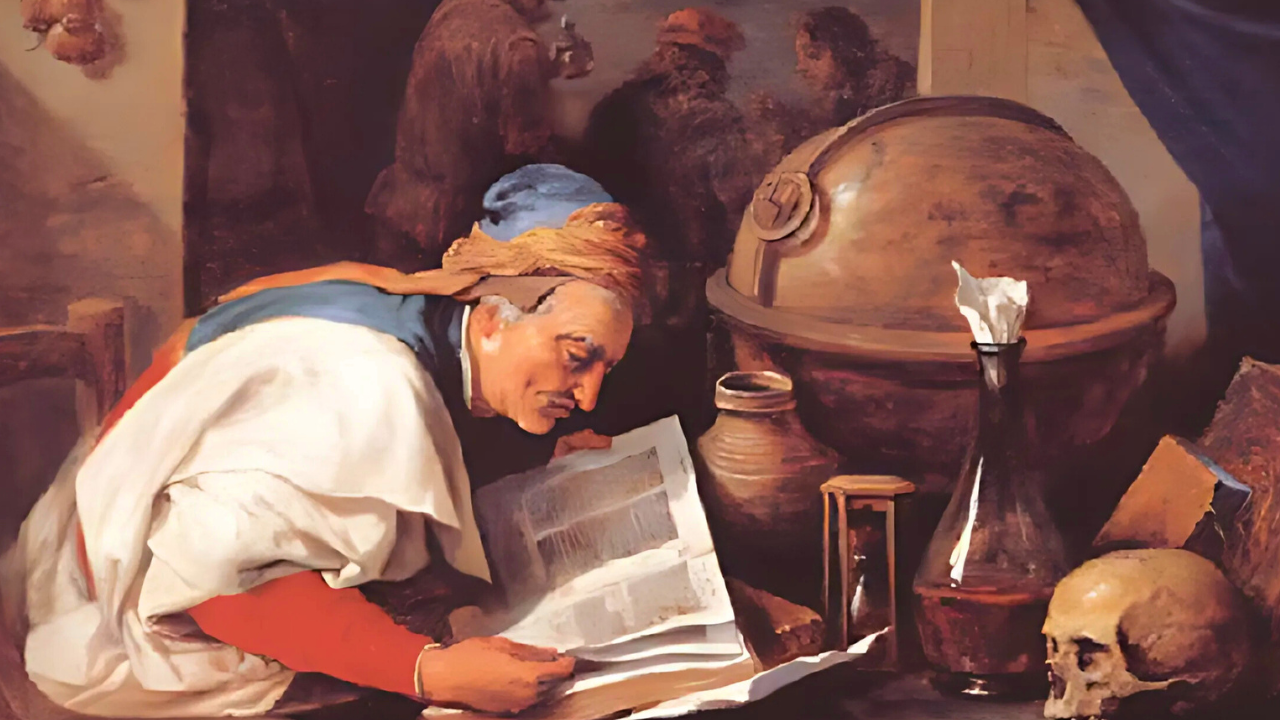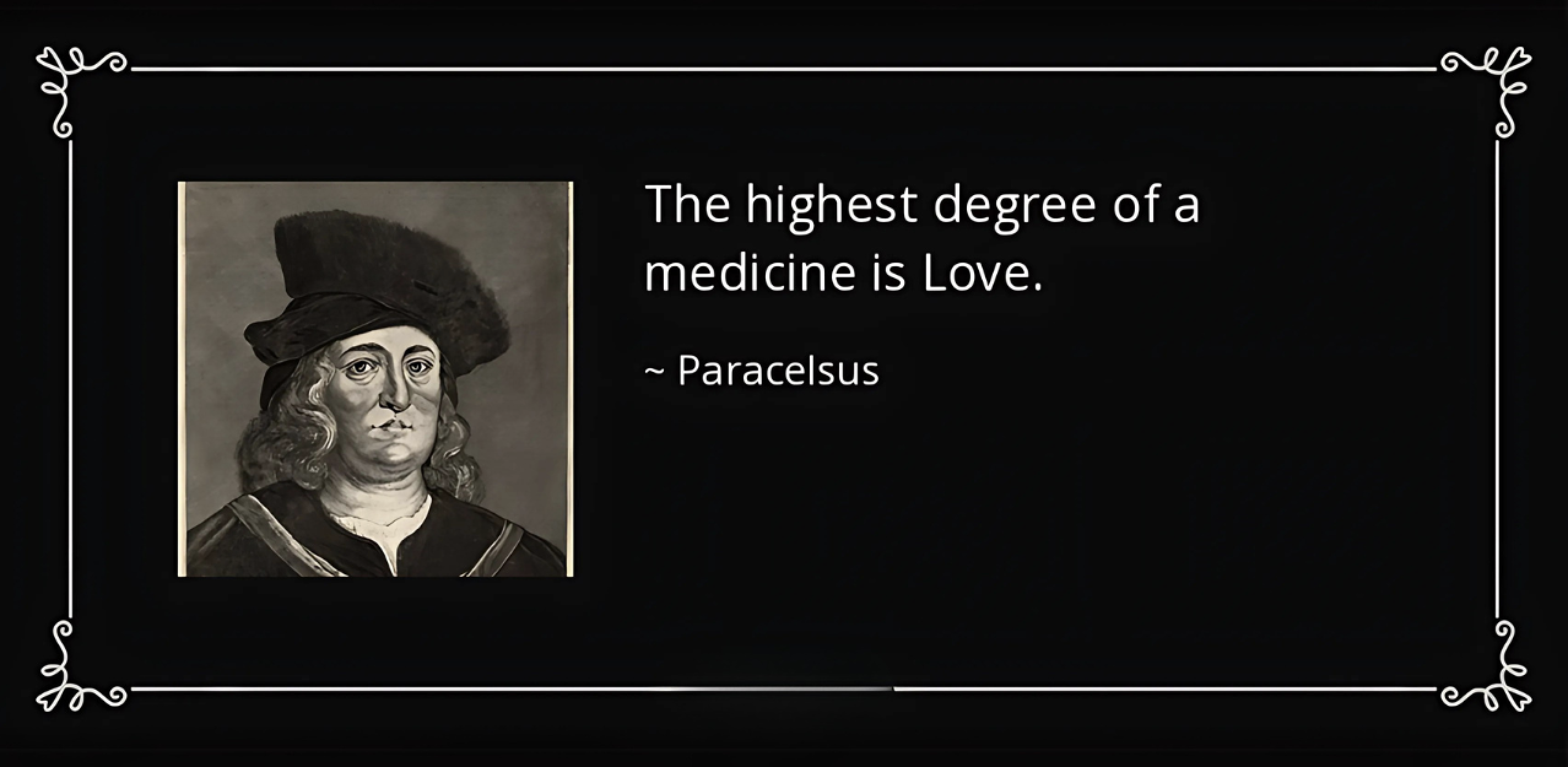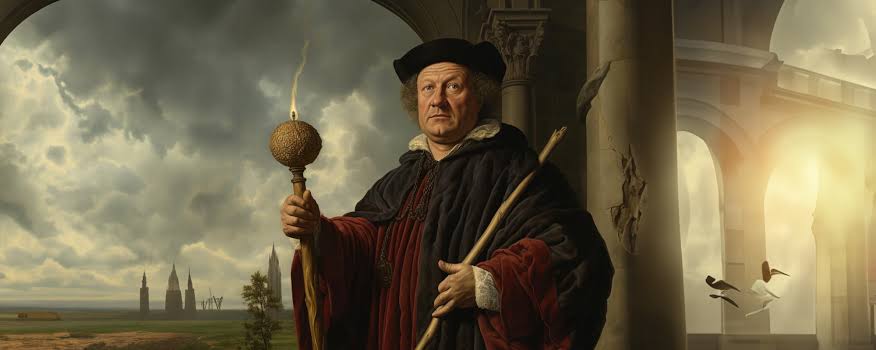Paracelsus: The Christian Physician Who Revolutionized Medicine
Apr 16, 2025
Paracelsus stands as one of the most profound and misunderstood figures in the history of medicine, alchemy, and spiritual philosophy.
Born Philippus Theophrastus Bombast of Hohenheim (1493-1541), this revolutionary thinker challenged the medical orthodoxy of his time while developing a deeply Christian worldview that integrated science, medicine, and faith in remarkable ways.
Though often portrayed simply as a maverick physician or alchemist, his writings reveal a man whose work was fundamentally driven by his Christian faith.
The Divine Foundation of Paracelsus's Worldview
At the core of Paracelsus's worldview was an unwavering belief that science and religion were inseparable.
Unlike many of his contemporaries who created artificial divisions between faith and natural philosophy, Paracelsus saw scientific discoveries as direct messages from God.
He believed it was mankind's divine duty to uncover and understand all of God's message through the careful study of nature.
"Paracelsus was a Christian in the true meaning of that word, and he always attempted to support the doctrines he taught by citations from the Bible," notes one scholar who carefully studied his works.
This spiritual foundation wasn't merely decorative- it formed the essential structure upon which all his medical and philosophical ideas were built.
For Paracelsus, becoming an effective physician required faith in God. He saw medicine not merely as a profession but as a divine mission.
He would teach aspiring physicians that good character combined with devotion to God was more important than personal skill alone, encouraging them to practice self-improvement and humility alongside their medical studies.

Standing Above Religious Sectarianism
During the tumultuous period of the Reformation, when Europe was violently divided between Catholic and Protestant factions, Paracelsus remarkably stood above these sectarian conflicts.
Rather than aligning completely with Martin Luther or remaining loyal to the Pope, he sought a deeper truth that transcended political religious divisions.
In fact, he was just as much a student of Eastern philosophies as Western, and spoke often about the Adepts. He always kept an open mind about spirituality.
"Among all sects there is none which possesses intellectually the true religion," he stated.
"We must read the Bible more with our heart than with our brains, until at some future time the true religion will come into the world."
This progressive stance revealed his commitment to the essence of Christianity rather than its political expressions.
Though his sympathies generally aligned more with the liberal Protestants, he rejected the notion that true faith could be contained within any single institutional expression.

The Three Pillars: Prayer, Faith, and Imagination
Paracelsus articulated three fundamental principles that formed the cornerstone of his wisdom and approach to both medicine and spirituality:
First was Prayer- or a strong desire and aspiration for that which is good. He taught that we should "seek and knock," thereby asking the Divine within ourselves.
With a pure and sincere heart, we would receive that for which we ask and find that which we seek.
Second was Faith- not merely belief in something that may or may not be true, but a faith based upon soul-knowledge and unwavering confidence.
He described this as "a faith that may move mountains and throw them into the ocean, and to which everything is possible, as Christ has Himself testified."
Third was Imagination- the power that, when properly kindled in the soul, harmonizes with faith.
Paracelsus observed that a person deeply immersed in thought "is like one who has lost his senses, and the world looks upon him as a fool.
But in the consciousness of the Supreme he is wise, and he is, so to say, the confidential friend of God, knowing a great deal more of God's mysteries than all those that receive their superficial learning through the avenues of the senses."
He believed that through these three principles- Prayer, Faith, and Imagination- a person could "grow to be like the apostles, and to fear neither death nor prison, neither suffering nor torture, neither fatigue nor hunger, nor anything else."

Rejecting Religious Hypocrisy
While deeply religious, Paracelsus was a fierce opponent of empty religious formalism. He argued that true Christianity wasn't found in external ceremonies, special clothing, self-flagellation, or public displays of piety.
"Salvation is not attained by fasting, neither by wearing a particular kind of clothing, nor by beating one's self," he wrote.
"Such things are all superstition and hypocrisy. God, from the beginning of the world, has created all things holy and pure, and they need not be consecrated by man.
God Himself is holy, and all that He made out of His own holy will is also holy. It is for us, by becoming holy, to recognise the holiness of God in all things."
This stance against religious hypocrisy did not mean abandoning religious practices entirely. Rather, he encouraged believers to outgrow and rise above externalism to become members of the "true inner Church of Christ."
Revolutionary Medicine Grounded in Christian Thought
Paracelsus radically departed from the medicine of his day, which was dominated by Galenic theories about the four humours.
Instead, he proposed three primary elements or "tria prima": salt (representing stability), sulphur (representing combustibility), and mercury (representing liquidity). He defined disease as a separation of one humour from the other two.
His approach to medicine was revolutionary in part because he believed that body organs functioned alchemically- they separated pure from impure.
While the dominant medical treatments of his time involved specific diets, purging, and bloodletting to restore balance to the four humours, Paracelsus objected to excessive bloodletting, asserting that it disturbed the harmony of the system.
Perhaps most innovative was his belief that illness resulted from the body being attacked by outside agents rather than merely internal imbalances.
Paracelsus’s belief that diseases came from external agents foreshadowed germ theory by centuries and fundamentally changed how people thought about illness and its causes.
Importantly, Paracelsus was among the first doctors to recognize that a person’s mental state and moral character could have a direct impact on their physical health.
He proposed that a person's psyche could both cause and cure disease, and argued that a person could maintain good health through sheer will long before our modern mind-body medicine.

The Microcosm and Macrocosm
Central to Paracelsus's worldview was the hermetic belief that sickness and health in the body relied upon the harmony between humans (the microcosm) and nature (the macrocosm).
He expressed this eloquently when he wrote: "Man is a microcosm, or a little world, because he is an extract from all the stars and planets of the whole firmament, from the earth and the elements; and so he is their quintessence."
This correspondence between the individual and the universe wasn't merely philosophical speculation but informed his medical practice.
He believed that "all is interrelated. Heaven and earth, air and water. All are but one thing; not four, not two and not three, but one. Where they are not together, there is only an incomplete piece."
This holistic perspective led Paracelsus to view the universe as one coherent organism pervaded by a uniting, life-giving spirit, which in its entirety, humans included, was an expression of God.
This view put him at odds with the Catholic Church, which necessarily maintained a difference between the creator and the created.
The Heart of Medicine is Love
Perhaps no statement better captures Paracelsus's integration of Christian love with medical practice than his assertion: "What else is the help of medicine than love?"
He similarly proclaimed that "The art of medicine has its roots in the heart. If your heart is false, then also the doctor in you is false. If it is fair, then also the doctor is fair."
These statements reflect his conviction that medicine was fundamentally a spiritual calling requiring not just technical knowledge but moral character and divine connection.
His famous dictum- "He who knows nothing, loves nothing"- captures his belief that true knowledge leads naturally to compassion and love, which in turn leads to healing.
Humility and Respect for All Creation
Paracelsus emphasized the importance of humility, both toward fellow humans and toward God.
"Practice humility at first with man and only then before God. He who despises man, has also no respect for God," he wrote, showing the connection between how we treat others and our spiritual development.
His respect extended to the natural world as well, which he saw as God's creation to be studied with reverence.
He questioned, "Who else is the enemy of Nature but he who mistakes himself for more intelligent than Nature, though it is the highest school for all of us?"
This perspective positioned Paracelsus against intellectual arrogance that would place human understanding above the wisdom inherent in nature.

The Spiritual Dimension of Alchemy
While often remembered for his contributions to medicine, Paracelsus was equally renowned as an alchemist, but his conception of alchemy wasn't based on changing lead into gold.
For him, "Alchemy is the art that separates what is useful from what is not by transforming it into its ultimate matter and essence."
This separation of useful from non-useful had both material and spiritual dimensions.
He saw the alchemical process as divinely ordained, explaining, "The alchemist takes the food and changes it into a tincture which he sends through the body to become blood and flesh. This alchemist dwells in the stomach where he cooks and works."
His famous statement that "All things are poisons, for there is nothing without poisonous qualities. It is only the dose which makes a thing poison" reflects his nuanced understanding of transformation and balance that characterized his alchemical thinking.
The Sacred Garden: Paracelsus on Plants and Vital Food
One of the most interesting things about Paracelsus was his love of plants, and he saw gardening as an intensely spiritual practice.
Far from viewing plants as mere vegetation, he recognized them as living messengers of divine wisdom, each carrying unique spiritual qualities.
According to Paracelsus, every plant speaks a silent language through its form, color, and growth patterns.
This "doctrine of signatures" suggests that a plant's appearance reveals its healing purpose- a heart-shaped leaf might benefit the heart, while a plant with yellow sap might address liver conditions.
For the enlightened gardener, this transforms planting and harvesting into a sacred dialogue with nature's hidden wisdom.

"The plant is the physician," he would say, believing that each herb and flower contains what he called a "working spirit" or "spiritus mechanicus."
This vital energy (or chi, as we know it) gives plants not only their physical characteristics but also their healing virtues.
When we consume plants as food or medicine, we receive more than just nutrients- we absorb this living essence.
For your dinner table, Paracelsus would emphasize quality over quantity. He believed the "spirit of life" in fresh, vibrant foods nourishes not just the body but also the soul.
Most fascinating was his concept of "spiritual mumie"- a transferable essence that carries the virtue and vitality of living things.
When we prepare food with intention and awareness, we engage with this essence, making our meals vehicles for both physical and spiritual nourishment. .
Conclusion: The Continuing Journey to True Religion
Paracelsus believed that the Kingdom of God begins here on earth, not merely in an afterlife.
"What we should be after death, we have to attain in life, i.e., holiness and bliss. Here on earth the Kingdom of God begins," he wrote.
This perspective challenged both the otherworldliness of some Christian traditions and the materialism of emerging scientific thinking.
His belief that "we must read the Bible more with our heart than with our brains, until at some future time the true religion will come into the world" speaks to his conviction that humanity's spiritual journey was ongoing, with greater understanding yet to come.
At a time when traditional religious boundaries are becoming less rigid and many people are seeking a form of spirituality that unites rather than divides, Paracelsus’s vision of a faith that harmonizes scientific exploration with spiritual depth feels especially relevant today
His legacy invites us to see healing not merely as a technical process but as a sacred act, and to approach both the natural world and our fellow humans with reverence, humility, and love.
As we continue to learn about the relationships between science and faith, mind and body, individual and cosmos, Paracelsus stands as both a historical pioneer and a continuing source of wisdom- a Renaissance physician whose insights still have the power to transform our understanding of health, healing, and wholeness.
If you're interested in learning more about Paracelsus, visit these links:
- Paracelsus and the Substance of His Teachings
- Stanford University Archive
- National Library of Medicine
Until next time!

